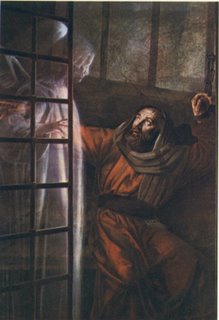 God, by His foreknowledge, knows all the prayers of men and had pre-ordained the events in the world taking those prayers into account. Though He hears all, God takes only into consideration those prayers directed towards the salvation and happiness of men.
God, by His foreknowledge, knows all the prayers of men and had pre-ordained the events in the world taking those prayers into account. Though He hears all, God takes only into consideration those prayers directed towards the salvation and happiness of men.God, Himself, desires the salvation and happiness of men. He has ordained to give men everything to attain these ends. But He withholds it until man asks for it in prayer. This is what happened to the Samaritan woman. Christ’s had so greatly desired to give her living waters. When the woman asked for it “Lord, give me this water.” Christ gave it to her. But only after she asked for it. The same thing with Mary Magdalene. Though a great sinner, yet God so desired to grant her salvation and gave it to her the moment she asked for it.
Charity is a theological virtue that is necessary for salvation. In fact, it is salvation itself. It is happiness. We can only possess these through prayer…..with great humility.
A blessed and happy life is the desire of every soul. A Happy life is what God wants to give us. If we ask in prayer for a happy life, God would surely give it to us. This happy and blessed life is Charity.
God created all things that man might realize that he is a beggar. He has to ask for everything. So man must realize that he can only go to Heaven if he asks for it. And if Charity is necessary for our happiness he must realize the great need to ask for it. And he should ask for it knowing his great need for it.
Prayer is raising our hearts and minds to God. Why? To find out His will for us. A Will he is desirous to reveal to us….if we only asked. With "Deus Caritas Est," Pope Benedict XVI had just told us what is God’s Will for us….to be happy-- and what is needed for the happiness and salvation of our soul. He told us what God wants to give us. We have only to ask….but ask like beggars, for such we are.
And since charity is the only thing we need to be happy and be saved, this is all we have to ask. All its adjuncts will also be given to us. If we need anything else to be saved, all will be given to us. “Seek first the Kingdom of God,and all the rest will be given to you.”
I think the Holy Father sees a problem: people do not know what God wants to give them. So they ask for the wrong things like prosperity and peace to accompany the enjoyment of that prosperity. God will give some degree of prosperity sufficient for the quest of charity. He gives this together with Charity as an adjunct and not apart from it.
Perhaps the Pope also sees the problem of people not even realizing the need for Charity for the salvation of one’s soul; perhaps he sees it ill-defined everywhere. People do not pray,
and those who wish to do so do not know how.
Aside from this, there is the problem of those who do not believe in God. What problems! Ronald Knox once wrote that if we can put ourselves for a moment in the shoes of the Pope and imagine the burden he carries, we would fall on our knees and weep.
And what about the other things in life? St. Thomas wrote: we may ask for everything else as long as it is needed for the attainment of charity. But first and foremost we should ask for charity. ("St. Peter's release from prison" by S. Pistolesi.)





